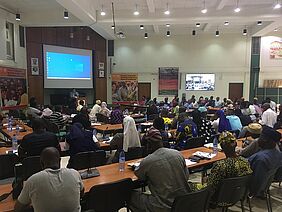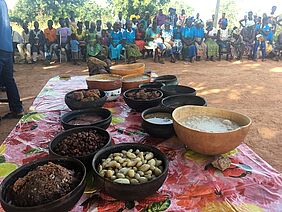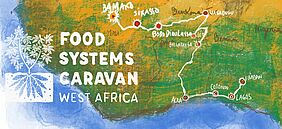It all started around two years ago, when FiBL researcher Fernando Sousa, the co-coordinator of the project ORM4Soil (Organic Resource Management for Soil Fertility) had the convincing idea to travel through five West African project countries on board of a project he called the "Food Systems Caravan". This idea received a grant from the food security module of the r4d programme (Swiss Programme for Research on Global Issues for Development), to tell the project participants of the various countries about the other ongoing r4d projects, document this trip with the talented film maker Sara Baga and to foster disseminating results within the framework of the r4d programme. This programme is a joint initiative by the Swiss National Science Foundation (SNSF) and the Swiss Agency for Development and Cooperation (SDC) and supports solution-oriented research projects aimed at solving global problems, especially in low- and middle-income countries.
Within the r4d food security module, FiBL coordinated ORM4Soil and participated in YAMSYS, two large projects with a strong focus on West Africa. The results of these two projects have been shared during the caravan, along with those of IFWA and FoodSAF – two other projects of the food security module.
Taking a rest in the busy city of Lagos, Nigeria, in November 2019 and looking back at the two months on the road and more than 30 events organized in Mali, Burkina Faso, Ghana, Benin and Nigeria, the "Food Systems Caravan" team could not know that the adventure was only just beginning.
In the years to come, the local "Food Systems Caravan” team members organized conferences, farmers’ sessions, open classes and seminars in universities and secondary schools, knowledge sharing events with NGOs and field workshops that reached a total of over 7200 participants. The events targeted policy makers, farmers and farmers’ representatives, researchers, students, civil society actors, extension officers as well as the general public. The team collaborated with diverse institutions in the five countries, from research institutes and universities to NGOs and farmer groups within their organizations. Among the most relevant partners were IER (Institut d'Economie Rurale), IPR (Institut Polytechnique Rural) and AMSD (Association Malienne pour la Solidarité et le Développement) in Mali, INRAB (Institut national de recherche agricole du Bénin) in Benin, University of Bobo-Dioulasso, INERA (Institut de l’Environnement et de Recherches Agricoles) and New Tree in Burkina Faso, the University of Ghana and OPC (Obrobibini Peace Complex) in Ghana and IITA (International Institute of Tropical Agriculture) in Nigeria.
The "Food Systems Caravan" promoted multi-stakeholder dialogues to upscale agroecological practices in the five countries. This engagement offered the opportunity for farmers and researchers to learn from each other while consolidating research results into practice. The initiative of an innovation platform of ORM4Soil to optimize the use of organic resources in Ghana’s rural sector was supported by Fernando Sousa’s successful proposal to fund a transformation acceleration grant of the r4d programme.
A wonderful collection of inspiring examples of projects using the principles of agroecology to improve the sustainability of food systems in West Africa is the documentary movie "The Green Vein". The film was screened for the first time in Bamako, Mali, in May 2021 and since then in all participating countries and on 2 November 2021 in Bern, Switzerland. It can be accessed online in 2022. The film features people in their fascinating projects that aim to change the way crops are grown, marketed and turned into food, and aims to stimulate the agroecological movement in the region.
Further information
Contact
Links
- foodsystemscaravan.org: "Food Systems Caravan" project
- r4d.ch: R4D programme
- laveineverte.org: The Green Vein film
- k4d.ch: Spin-off of ORM4Soil and "Food Systems Caravan"






